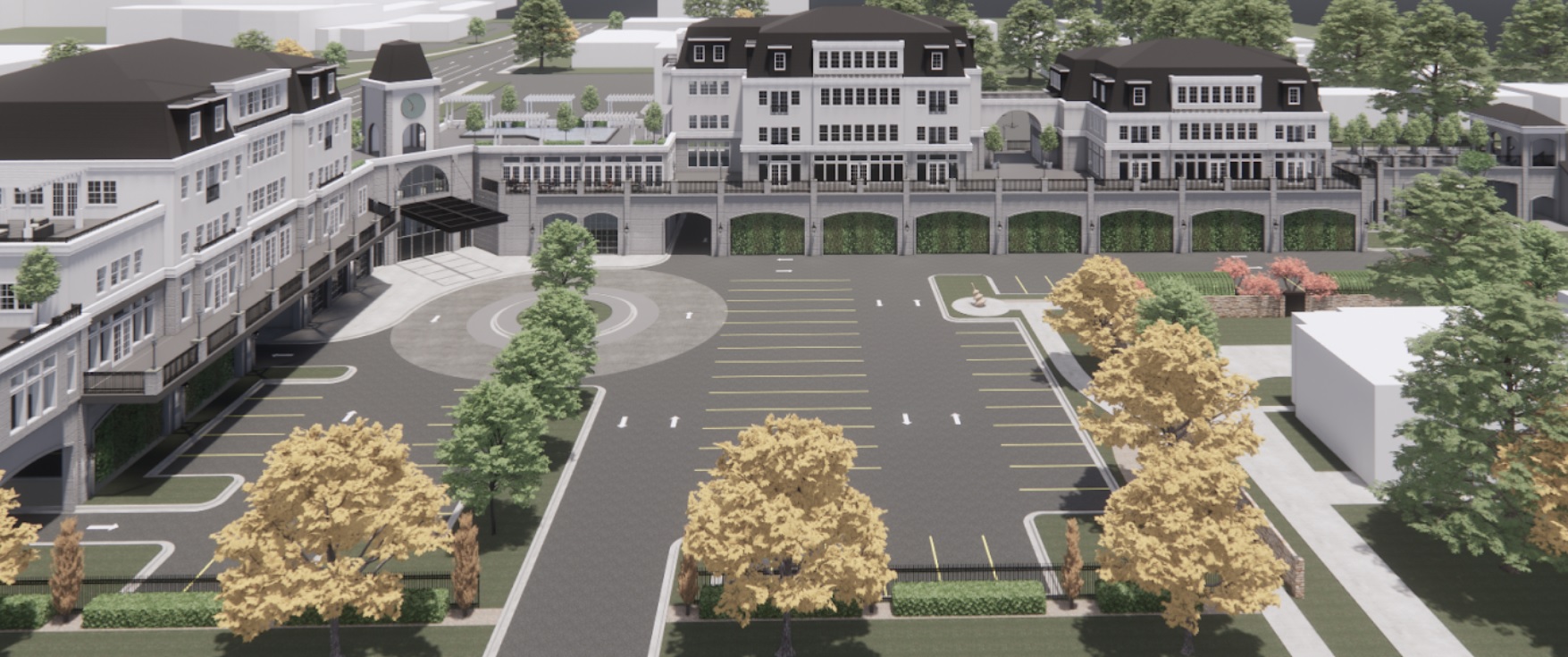Some University Heights homeowners stepped out of Springfield Historic City Hall upset and feeling unheard, while one city councilman’s proposal to put a stop to all development on a corner ripe with controversy has been delayed.
The Springfield City Council voted 6-3 on Jan. 23 to send a proposed moratorium on development and rezoning in certain parts of University Heights to a council committee, which will study and debate the idea further. The affected area is on National Avenue from Grand Street to Sunshine Street, and on Sunshine Street from National Avenue to Robberson Avenue.
Councilman Craig Hosmer wanted the freeze on development, and said he did so because people in University Heights were fighting against a proposed development called The Heights at the corner of Sunshine and National.
“People complain about neighbors fighting for their neighborhood — if we don’t have neighbors fighting for their neighborhood, what are we going to have?” Hosmer said. “If people don’t care about their neighborhood in this city, God help us.”
Hosmer introduced a bill to delay development along Sunshine Street and National Avenue along the borders of the University Heights neighborhood to allow time for a corridor study.
Zone 2 Councilman Abe McGull made the motion that sent Hosmer’s proposed resolution to the Springfield City Council Plans and Policies Committee. McGull felt the resolution as it was presented could have opened up Springfield to lawsuits.
“These types of actions can bring about litigation for the city, because the timing of this with everything else around it, and it involves a Fifth Amendment right,” McGull said, referring to constitutional protection against taking private property. “I’m just uncomfortable doing this as a resolution, I think we should have some debate on this, some articulation.”
McGull said the committee will be able to critically examine the proposed delay, and hear from stakeholders in University Heights.
“People have an opportunity to talk about it, landowners have an opportunity to talk about it, citizens have an opportunity to talk about it, and it doesn’t look like we’re doing targeted zoning,” McGull said.
The 6-3 vote broke down with McGull, Mayor Ken McClure and council members Matt Simpson, Andrew Lear, Heather Hardinger and Richard Ollis voting “Yes,” and Hosmer, Monica Horton and Mike Schilling voting against the committee referral.
University Heights residents could be heard saying, “I thought we were going to speak,” “So we don't get to speak?” and a sarcastic, “Thanks for listening,” as they exited the City Council chambers Jan. 23.
How did we get here?

BK&M, or “Be Kind and Merciful,” is a development group seeking to put a commercial development with restaurants, shops, offices and apartments at the intersection of Sunshine Street and National Avenue, catty-cornered from the Mercy hospital campus.
Be Kind and Merciful’s architect, BOTI Architects President Bo Hagerman, said the buildings could be anywhere from 75,000 and 200,000 square feet in size, and they could be five or six stories tall.
The developers said multiple times that the intersection of National Avenue and Sunshine Street is the “second-busiest intersection in Springfield,” seeing about 70,000 cars on a typical day. The Heights would have two entrances and exits, a main driveway on Sunshine Street, and a secondary entrance and exit on University Avenue.
Concurrently, in November, the City Council voted to enact Forward SGF, a comprehensive plan for growth and development for the next 20 years. At the same time, the BK&M case came up for lengthy public debates against heavy opposition from property owners in University Heights.
Councilman questions city manager
During the meeting Jan. 23, Hosmer asked a series of questions to Springfield City Manager Jason Gage. Hosmer questioned why it appeared in City Council documents that city staff had initially recommended the proposed delay be approved, and then recommended its denial sometime after Jan. 17.
“Staff initially supported this change, what happened between Jan. 17 and when staff suddenly came up with the provision to be against it?” Hosmer asked.
“From the beginning, my position has been the same,” Gage said. “It’s about the timing of this. I agree with neighborhood plans and corridor plans. As you’ve mentioned, we’ve done a lot of them, I think they’re very good.”
Gage said this time, Springfield has a new comprehensive plan, so it’s different.
“In those other circumstances, we didn’t just have a new comprehensive plan that has really a much different approach to land use with place types in exchange for the higher quality design to benefit quality of place,” Gage said.
Gage said Springfield’s building codes don’t line up with all of the goals in Forward SGF, and so the process of matching codes to the comprehensive plan will be important in the future.
Hosmer questioned Gage as to whether or not he met with the developers from BK&M, the University Heights Neighborhood Association and/or representatives of the Springfield Chamber of Commerce. Gage answered “No” to all three.
“There’s a reason that neighborhoods in this community feel like they’re getting the short end of the stick, because the developer has your ear, the developers have the ear of council and neighborhoods don’t,” Hosmer said. “And I think they’re getting tired of it.”
Planning and Zoning Commission ordered corridor study

The Springfield Planning and Zoning Commission voted 4-3 to recommend the study and draft of a corridor plan for two key stretches of road surrounding University Heights. The request wrapped up nearly two hours of discussion on Nov. 17, that originally started with the idea of writing a neighborhood plan for the future of the University Heights neighborhood.
At the November meeting, Springfield Principal Planner Randall Whitman, the project manager for Forward SGF, said that corridor plans and neighborhood plans both look beyond land use.
“It would entail zoning, it would entail land use, public improvements, it would look at how the comprehensive plan makes recommendations about diverse housing, what infrastructure needs to be put in place to look at that,” Whitman said. “It looks at neighborhood preservation, it looks at the streetscape elements, it looks at neighborhood hubs.”
Lawsuit still pending
On Jan. 20, the developer filed a motion to dismiss a civil lawsuit that would stop the Heights project.
Twelve University Heights residents are the plaintiffs in a lawsuit filed against BK&M and three other defendants Dec. 9.
The plaintiffs in the lawsuit are Dixie Sleight, Barbara Robinson, Doug and Erinn Johnson, Anna Squires, Rod and Lisa Dixon, Rebecca Gilmore, Mark Wealand, Steve Waddell, Jenni Thomson and Virginia Olson. They are referred to in the lawsuit as the “UH Preservation Group.”
The suit relies on nearly century-old documents from when University Heights was platted in 1925. The plaintiffs claim developer Eloise Mackey created a series of deed restrictions when University Heights was platted, and that the restrictions should still be enforceable today.
“In addition to the recorded deed restrictions, throughout 1925-1927, Mackey advertisements in local newspapers heavily touted the existence of the restrictions,” a provision of the lawsuit reads.
Precedent for pausing development
Administrative delays and/or development moratoriums have been used at other times to create opportunities for discussion and neighborhood planning. Hosmer’s own neighborhood, Rountree, had an administrative delay on development that expired in March 2018. The City Council also put a 180-day administrative delay on what is now the three-mile Grant Avenue Parkway zone in 2020.
During debate Monday night, Hosmer pointed out that none of the previous administrative delays in the last decade have been referred to a city council committee before they were enacted.
Nov. 5, 2018, the Springfield City Council passed a resolution to put an administrative delay on rezoning or lot consolidation in the Galloway Village neighborhood for 270 days. The resolution passed with an 8-0 vote, which included approval from present day council members Schilling, Lear and Ollis, along with Simpson, Hosmer and Mayor McClure.
The moratorium on rezoning in Galloway Village expired Aug. 2, 2019. After an appellate court ruling in 2022, a rezoning case in Galloway Village came up for a vote of all eligible voters in Springfield.
More than 70 percent of the 46,616 Springfield voters who cast ballots Nov. 8, 2022, voted against Springfield Question 1, a referendum question that would have rezoned 4.2 acres of land in the 3500 block of South Lone Pine Avenue. Developers Mitch and Amanda Jenkins of Elevation Enterprises sought change to a planned development zone, clearing the way for construction of a mixed-use project that would include retail and office spaces and about 100 apartments.
Today, a court case involving the Elevation Enterprises zoning dispute on Lone Pine Avenue may or may not proceed. As of Jan. 23, 2023, Elevation Enterprises still owns the property in question opposite Lone Pine Avenue from Sequiota Park.


